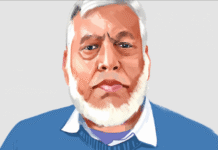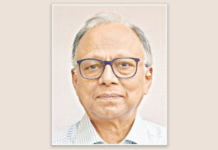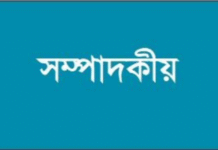We commend the Election Commission for initiating dialogues with the stakeholders although it is not legally obliged to do so. We hope that the dialogues are not held for their own sake, and that the commission will take the recommendations of the stakeholders seriously. Most of all, we hope it will forcefully implement the existing laws to ensure free, fair and credible elections.
Article 119 of our Constitution mandates that the EC will hold parliamentary elections. Elections necessarily mean free, fair and credible elections. Elections also mean competitive elections, as “to elect” implies choosing from alternatives. To ensure such elections, the EC must create a level playing field for all electoral contestants. Ensuring a level playing field requires not only taking actions by the commission after the declaration of the election schedule, but also at all times.
The EC is not constituted only for holding elections. It is a constitutional body created to perform a host of other functions round the year to ensure that the elections are free, fair and credible. Thus, it must be always vigilant.
The EC is a regulatory authority and the political parties have to be registered under it. Thus, as their regulatory authority, the EC has the obligation to ensure that all political parties can carry out their normal political activities at all times. The commission also has the inherent authority to do so. According to Bangladesh Supreme Court, the EC has the power “to supplement the statutory rules for the sole purpose of ensuring free and fair elections” [Altaf Hussain vs Abul Kashem 45DLR (AD) 1993]. Thus, to claim that it does not have the authority to regulate the activities of political parties before the declaration of election schedule amounts to shying away from its constitutional responsibilities.
In this regard, we can take lessons from the Indian experience. In 2002, the Indian Supreme Court ordered that candidates running for Parliament must declare their antecedents, such as criminal records, wealth statements in the form of affidavits. The Indian EC proposed to its relevant ministry to change the rules in order to implement the judgment, but the ministry failed to do so. The commission then went ahead and unilaterally implemented the court judgment with a circular, even though it did not, by law, have the rulemaking authority. It should be noted that our commission has the legal authority to frame rules.
The deployment of armed forces during elections would be critically important for ensuring free and fair elections. The armed forces, by law, were part of the law enforcement agencies during the 9th parliamentary elections, in which Awami League had a landslide victory. Thus, the ruling party’s objection to having the armed forces play the same role is not very persuasive. Besides, opinion surveys have repeatedly shown that people hold armed forces in high esteem and they would naturally feel safe with the armed forces around during elections, especially because of blatant partisan roles of our politicised law enforcement agencies in the past. Furthermore, according to media reports, the field level election officials, who will be responsible for conducting the elections, want the armed forces in the field during elections.
In addition to changing the definition of law enforcement agencies, free and fair elections would require further amendments of the RPO to: (1) bring back the provision of “no” vote; (2) include the requirement of affidavit for disclosures and tax returns for reserved seats in Parliament; (3) online filing of nomination papers; and (4) publishing on websites the names of all members of the political parties and updating those regularly. Readers may remember that “no” vote was part of the law prior to the 9th parliamentary elections. It may also be noted that the Indian Supreme Court in 2013 ordered the institution of “no” vote in their parliamentary elections.
Credible elections also require reliable electoral roll. Our present electoral roll has serious flaws in that it has a major “gender gap”. Since nearly 10 million Bangladeshis work abroad, most of whom are male and many of whom are not voters, we should have more female voters in our electoral roll than male. It is not thus surprising that we had more than 1.4 million female voters compared to male voters in our electoral roll in 2008. However, since then women have been under-enrolled, and according to the latest count, the gender gap was 20 percent.
For elections to be free, fair and credible, there must also be clean candidates. Buying political party nominations by undesirable elements is rampant in our country, which can perhaps be prevented if grassroots party functionaries are given a say in the nomination process, as required by the RPO. The EC must vigorously enforce it. The commission must also enforce the disclosure requirements. According to the RPO, if candidates hide information or provide misleading information in their affidavits, their nominations must be cancelled, and if elected, their elections must be declared void. Thus, post-election forensic audit of selected affidavits could largely clean up our electoral arena. Similar scrutiny of election expense reports can also help us dispel the image that “we have the best democracy money can buy”.
Democratic and transparent political parties are also an essential prerequisite for free, fair and peaceful elections. The RPO requires political parties to have internal democracy and financial transparency. The EC must enforce these provisions of the RPO. It must scrutinise its audited statements. It must also insist that political parties disband their associated and affiliate bodies and foreign branches, as required by the RPO.
One of the goals of delimitation of constituencies is to reduce the dispersion in the number of voters among constituencies. But the delimitation of 88 constituencies under the Rakib commission further increased the disparity in the number of voters among constituencies. The current commission, therefore, must pay attention to such anomalies. It must also limit the number of constituencies for metropolitan areas like Dhaka city.
Finally, for the EC’s actions to be effective and acceptable, it must have credibility. Its credibility was already undermined to some extent by the non-transparent manner in which it was constituted. It was further compromised by the recent unilateral decision by the CEC, along with the commission secretary, to transfer a large number of EC officials without consulting other commissioners. It should be noted that the EC is a composite body and the CEC cannot take any substantive decision without the authorisation of other commissioners. Thus, one of the highest priorities of the EC at this time is to gain credibility among citizens.
Source: The Daily Star









